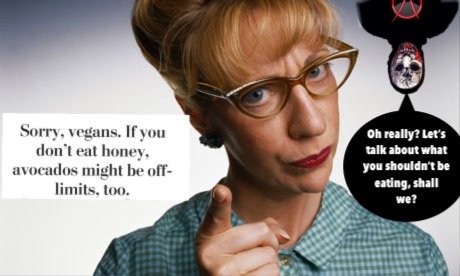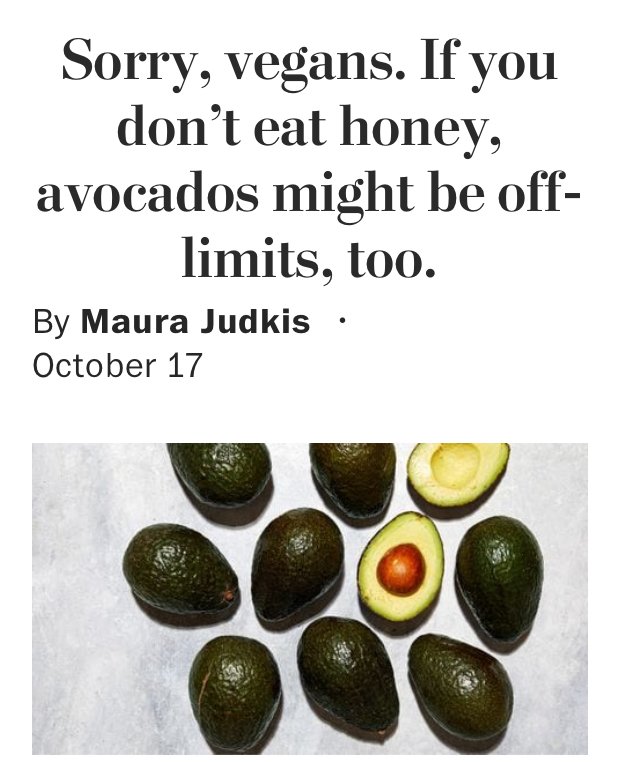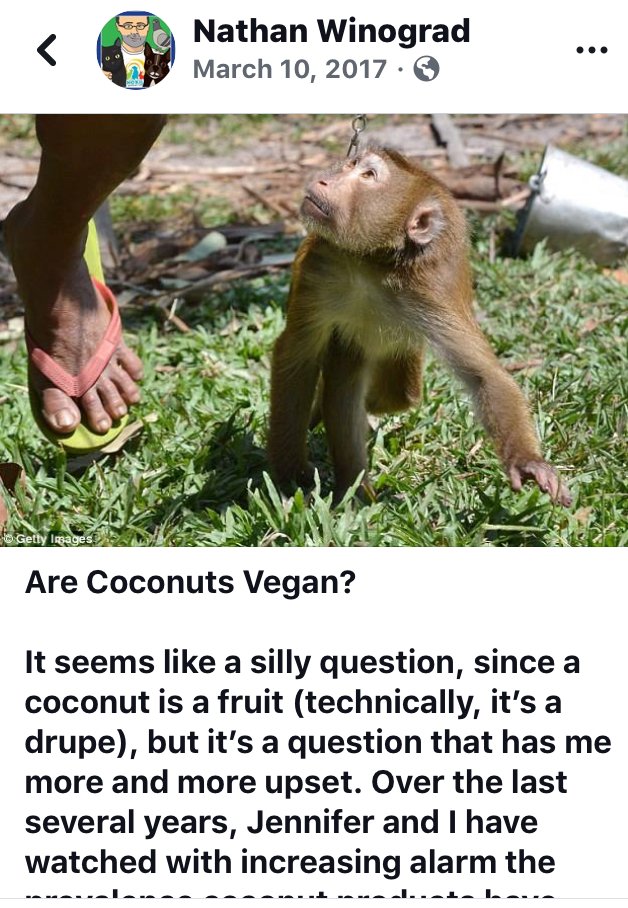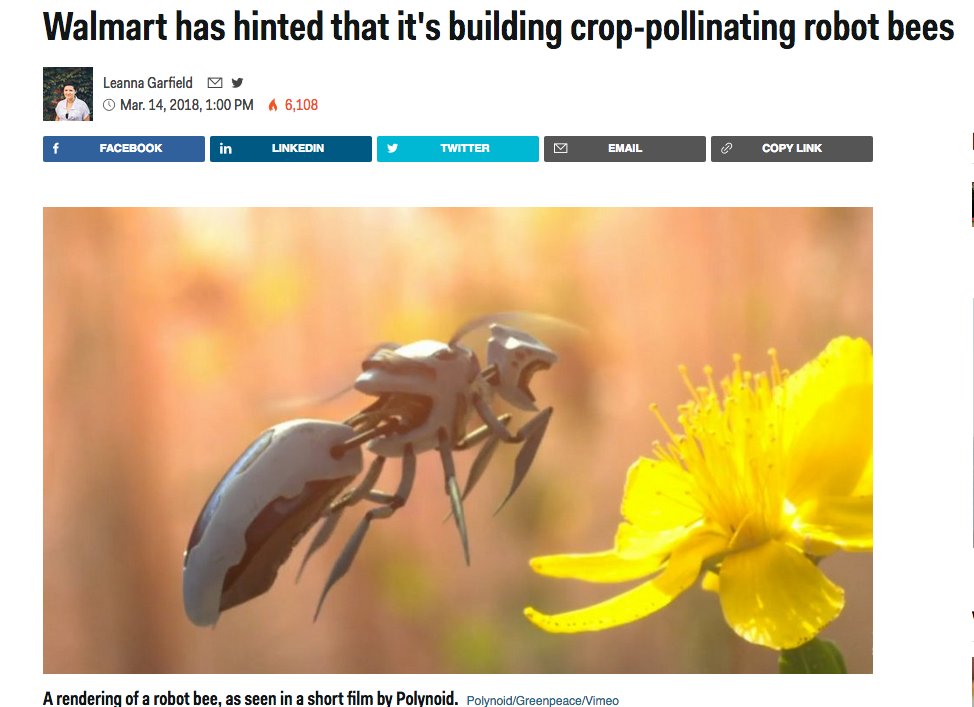

“Vegans eschew not only products made from animals, such as bacon and leather, but also products made by animals — the most obvious examples being milk and butter. For some vegans, this extends to honey, because it is produced from the labor of bees. Honey-avoiding vegans believe that exploiting the labor of bees and then harvesting their energy source is immoral — and they point out that large-scale beekeeping operations can harm or kill bees.
So why are avocados problematic? As the website the Conversation (and the British quiz show QI) points out, some avocados (and almonds) are produced by the work of bees, too. Honeybees pollinate many of our favorite fruits and vegetables, but in much of the United States, there are not enough bees to do this job naturally or efficiently. So farmers employ a practice called migratory beekeeping: They truck hives into their fields, where the bees live for short periods to pollinate the crops during the plants’ most fertile window. An in-depth article from Scientific American outlines just how important this practice is to farming and what effect it has on our ecosystem. The magazine estimated that without migratory beekeeping, the United States would lose one-third of its crops.“
Derp! Haha, sorry vegans! Your avocados aren’t vegan haha.
Yeah. It’s true. Some foods are produced off the backs of animals for our consumption. SOME! Not all the avocados (and other crops) are pollinated using migratory beekeeping.
“Home Sick: Effects of migratory beekeeping on honey bee disease.”
Another crop that is produced or rather harvested via animal labor are Coconuts. This is by far much worse than migratory beekeeping. I’ll let this post by Mr. Nathan Winograd explain the issue with coconuts.

Are Coconuts Vegan?
“It seems like a silly question, since a coconut is a fruit (technically, it’s a drupe), but it’s a question that has me more and more upset. Over the last several years, Jennifer and I have watched with increasing alarm the prevalence coconut products have begun to play in the promotion of the vegan diet: Daiya cheese, Miyoko’s butter, Beyond Meat’s burgers, and more. It is in almost all shampoos and conditioners. In shaving creams and lotions. It is in non-dairy ice creams and other plant-based “milk” products. Coconuts and coconut products -- oil, milk, and cream -- are the “go to” vegan ingredient and they are in most of the new vegan product innovations.
In 2016, a new plant-based product was introduced almost every single day, 100 more than the year before, and growing at a rate of 11% per year. In fact, the staggering growth had Tyson’s CEO explain his company’s $150 million investment in meat-analogs. “The future,” he told Fox Business News, “might be meat-free”: https://goo.gl/CRNV02 Driving this growth is "Growing concern toward animal cruelty and welfare": https://goo.gl/Blj94Z And yet, the majority of those products are coconut-based. And eating coconuts often supports terrible animal cruelty.
The vast majority of coconuts sold across the world come from Southeast Asia, from countries like Thailand and the Philippines, where they are picked by abused primates:
Agile and adept climbers, pig-tailed macaques are acquired as infants by trainers who find them in the wild, shoot their mothers to steal the baby primates, chain them by the neck and train them to climb trees and pick coconuts through the use of terrible brutality. They are trained into submission with whips and beatings. This includes forcing the monkeys to develop strong back leg muscles so that they can stand upright, an unnatural position for these animals, by hanging them by their neck for hours, even overnight, to develop strength.
Using monkeys to harvest coconuts is profitable, as these animals can pick up to 1,200 coconuts a day, while humans can only pick a few hundred. Monkeys are not only worked to the point of exhaustion -- one trainer admits they faint during the course of the day -- they are fed stimulants and caffeinated beverages to force them to work even harder.
They are forced to endure dangerous working conditions, including being forced to jump from tree to tree by grabbing unreliable palm fronds, which they are often frightened and reluctant to do because if the palms break, they could fall to their deaths. And they are deprived of socialization with their kind.
It is, in a word, slavery.
Recently, I came upon a video of a young man living in Thailand who has been working to bring global awareness to this issue. His excellent video explaining this issue can be viewed here:
His video capturing the abuse monkeys endure during training can be viewed here:
When Jennifer and I first found out about this, we began writing to companies that produce plant-based products to inquire about their coconuts. We were naive. Instead of asking them where they sourced their coconuts, we asked them if their suppliers used primate labor. Every company we reached out to, except Beyond Meat which simply did not respond to numerous requests, claimed they were primate-labor free. And yet, since Southeast Asia supplies 85% of the world’s coconuts and virtually all the plantations there use primate labor, the casual assurances became dubious. Coconut industry spokesmen admit that such a claim is “hard to believe” since, in Thailand like other Southeast Asia countries, monkeys pick 99 percent of the coconuts harvested: https://goo.gl/T8YRBZ So we stopped buying coconut products sourced from anywhere outside the Americas (where macaques do not exist).
25 years ago, I became vegan because I did not want to contribute to hurting animals. For the same reason, I no longer buy products with coconuts sourced from Southeast Asia.
For those who use coconut oil, coconut butter/cream, and shredded coconut in recipes, you can feel confident buying from https://thepureway.com/ All of the products are sourced from an animal-free farm in Mexico. Their website also has an easy recipe for making coconut milk from their shredded coconut.”
Here's a Washington Post article on the issue: https://www.washingtonpost.com/news/morning-mix/wp/2015/10/20/the-murky-ethics-of-making-monkeys-pick-our-coconuts/
Here's an NPR piece: http://www.npr.org/sections/thesalt/2015/10/19/448960760/monkeys-pick-coconuts-in-thailand-are-they-abused-or-working-animals
Here's a UK Daily Mail piece: http://www.dailymail.co.uk/news/article-3247422/Abducted-babies-chained-trained-pick-1-000-coconuts-day-Revealed-billion-pound-coconut-water-industry-built-abuse-monkeys.html
Here's a Bangkok Times piece: http://www.bangkokpost.com/archive/pay-coconuts-get-monkeys/681936
Back to bees and the Washington compost article.
“But here’s what the debate hasn’t mentioned: Avocados and almonds aren’t the only crops that are pollinated in this manner. Migratory beekeeping is a slippery slope that — for those who wish to avoid it — could change the scope of veganism. Other fruits and vegetables that may be produced through migratory pollination include apples, plums, cherries, alfalfa, blueberries, watermelon, cantaloupe, cucumbers, pumpkin, lettuces, squash and tangerines. Not every item in these categories is produced in this manner, but unless a vegan were to know the practices of the farm of origin, they would have no way of knowing whether bees were exploited in the making of that squash salad.”
“PETA sent The Washington Post a statement about its stance on migratory beekeeping: “Going vegan is about making kind choices that bring about positive change. Average shoppers can’t avoid produce that involved migratory beekeeping any more than they can avoid driving on asphalt, which has animal ingredients — but they can save nearly 200 animals’ lives every year by choosing plant-based foods instead of meat, eggs, and dairy ‘products,’ ” said PETA Executive Vice President Tracy Reiman.”
Now, I don’t think PETA should ever speak on anything to do with the ethical treatment of animals. If you’ve done any research into peta at all, you’d learn quickly that they are practically a slaughterhouse for domestic pets. But I digress.
This article about what crops vegans can eat is totally missing the real problem here. Which, is the lack of bees to pollinate food! The bees are dying off and it’s not because vegans want to ‘slurp avocado and almond milk smoothies’. It’s because of the bad agricultural practices of big agribusiness. The massive (pesticides/herbicides drenched) monoculture crops (predominantly grown to feed livestock), that are having a huge impact on bee populations.
Genectically modified crops, neonictinodes, many factors have lead up to this point of bee decline.
##Country-specific effects of neonicotinoid pesticides on honey bees and wild bees
Do the powers that be care? Care?, Are you kidding me? They are counting of it! Bees, are a precious resource, but yet... they lack a certain manufacturable quality.
However, a robotic equivalent could do the work of a bee and then some. They could work longer, last longer, and be impervious to pesticides and predators. They could be manufactured for cheap and with the minimal amount of resources. It would open up a whole new agricultural market.
Why companies like Walmart are already jumping on this opportunity, locking down on patents for robotic bees.
Walmart files patent for Robot Bees (Pollination Drones

But enough of all that. The question is, how can we save the bees? There are many ways in which to do your part.
Grow as much of your own food as you can. If you cannot grow food, purchase food from local organic sources, as much as possible. If you can’t do that, you can purchase organic at any grocery chains that has a decent selection.
Now, don’t fall for the bs the msm will try to spread about organic crops. Like how organic pesticides are just as bad and all that gobbledy goop. For one thing, organic farms use organically approved pesticides/herbicides only when the infestation is too severe to manage in any other way. Whereas with conventional (aka poison) farming, they use synthetic pesticides/herbicides regardless of the situation.
For two, the organic pesticides/herbicides are non-systemic, meaning they only stay on the outside of the plants and can be washed off. Whereas with systemic pesticides/herbicides used on a convectional crop, will persist inside the plant. Meaning you could wash the produce 100 times in a row, you will still be eating the poison at the end of the day.
If buying all organic is too hard on your wallet, you can help mitigate the cost by basing your shopping on the clean 15/dirty dozen rule.
EWG'S 2018 SHOPPER'S GUIDE TO PESTICIDES IN PRODUCE™
Clean Fifteen
Dirty Dozen
Now for people who eat meat. Here’s how you can help your fellow bees. commercial farming is by far the cruelest way to acquire your meat. The animals are fed enormous amounts of seed, grains, pulses grown on massive patches of cleared out land. I would suggest that instead of buying factory farmed meat from a grocery store. You buy an entire animal from a local farmer. You will save money, have your meat for the year, and only cause the death on one creature as opposed to thousands of creatures in the end.
As for dairy, you need to drop that shit altogether. What are you a baby cow? Not to mention the amount of estrogen in dairy accounts for 60 percent to 80 percent of estrogens consumed. Also the average dairy cow can eat over 100 lbs. of feed per day. That’s a lot of feed! But I digress.
Final thought.
In a perfect world we cause zero suffering to any creature and food would be abundant and evenly distributed among the people. However, this is not the case. Some of us have are bloated fat bodies of obese overconsumption and some of us are starving to death. And inbetween are people who consciously decide what we consume, and where we consume it from. The goal is to choose the food path of least perniciousness.
I’m often referred to as a vegan, but technically, because I consume honey, I am not. I’m more of what you would call ‘whole food plant based’. However, it still bothers me when these msm articles come out, trying to push blame and guilt onto vegans, when it’s soo far from the actual truth of the actual harm being done.
Thanks for reading. Please leave your questions,comments and/or complaints in the comment section below.
Other ways you can interact with me.
Whaleshares: Venomnymous
Weku: VenomnymouS
Twitter: VenomnymouS
Vero username: Venomnymous
Youtube: I Am AwareWolf
Minds @venomnymous
Somee.social: VenomnymouS
Notice a pattern yet?
Discord @venonymous#7826
Trybe.one: venomnymous
Bitchute : venomnymous
Referral links
Presearch signup
https://presearch.org/signup?rid=101528
BUNZ: Upcycle your old stuff and earn Crypto posting ads for your old stuff.
Have you tried Bunz? Sign up using my link and get an extra 500 BTZ.
https://epap9.app.goo.gl/7twSxDsAuUcs3BsG8

Downvoting a post can decrease pending rewards and make it less visible. Common reasons:
Submit
LoL exactly!
Downvoting a post can decrease pending rewards and make it less visible. Common reasons:
Submit
This article is soo good. I had no idea about coconut farms using monkey slave labor. That shit is wack. Im fairly certain that here in India they pick them by hand cause I see those guys climbing the trees. I think the monkeys here probably wouldnt stand for that (no pun intended but still funny)
Growing your own food as much as ossible iss definitely the solution. Im dreamig of a permaculture paradise :)
Ps. Concrete has animal products in it? That is so evilly appropriate.
Posted using Partiko iOS
Downvoting a post can decrease pending rewards and make it less visible. Common reasons:
Submit
Thanks! Yeah it’s really messed up how they treat those monkies. I’m glad to hear that at least the people are harvesting coconuts themselves in India. I’ll keep that in mind next time I need a tub of coconut oil.
There’s really nothing more satisfying than eating food that you grew yourself.
I’m not sure about that animal products in concrete. Something to look up for sure.
Downvoting a post can decrease pending rewards and make it less visible. Common reasons:
Submit
Downvoting a post can decrease pending rewards and make it less visible. Common reasons:
Submit